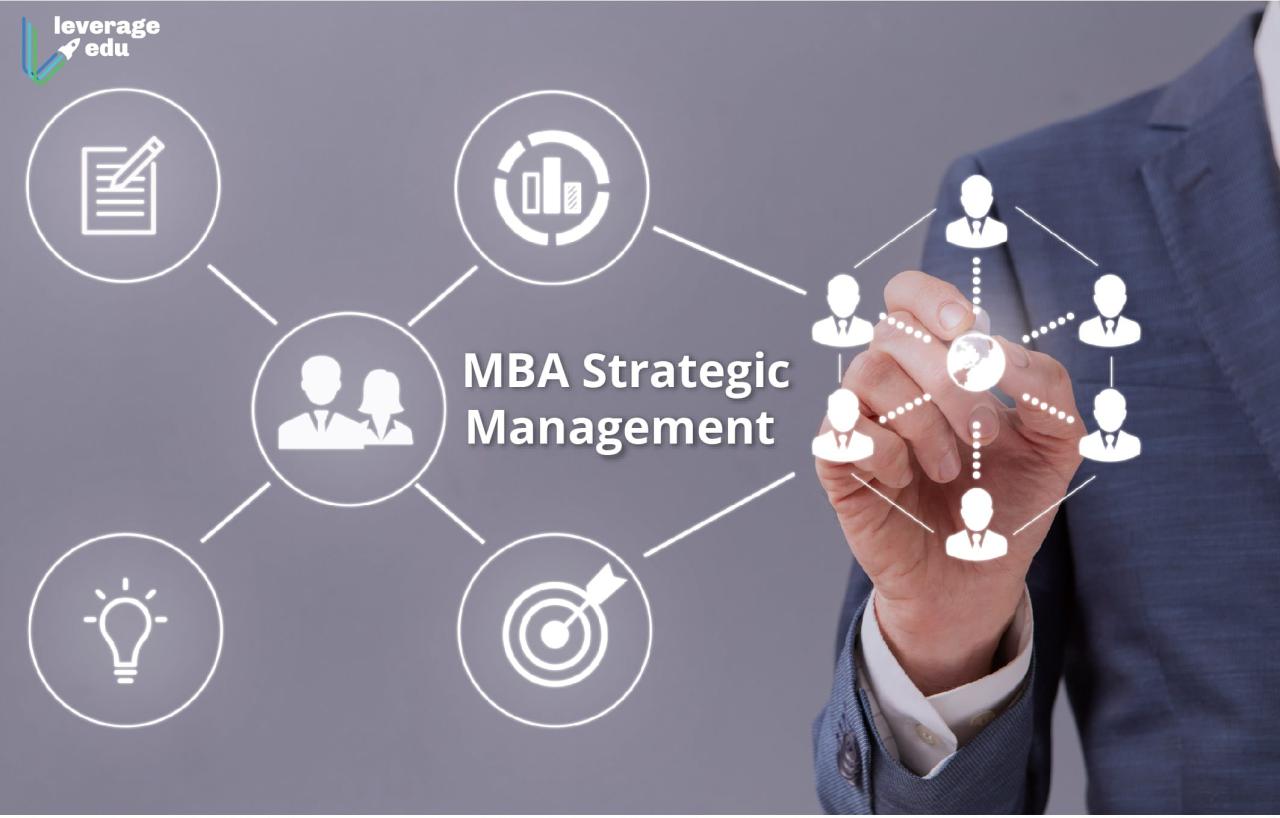Embark on a transformative journey with an MBA in Strategy and Leadership. In today’s dynamic business landscape, this specialized degree empowers you with the skills and knowledge to navigate complex challenges, drive innovation, and achieve unparalleled success.
From defining the role of strategy and leadership in modern organizations to exploring career opportunities and program curriculum, this comprehensive guide will provide you with a thorough understanding of the MBA in Strategy and Leadership.
Overview of MBA in Strategy and Leadership
An MBA in Strategy and Leadership is a specialized degree program designed to equip individuals with the knowledge, skills, and perspectives necessary to excel in strategic decision-making and leadership roles within organizations. This program focuses on developing a comprehensive understanding of business strategy, leadership principles, and organizational dynamics to enable graduates to navigate complex business environments effectively.
If you’re pursuing an MBA in strategy and leadership, it’s essential to learn from the best. Check out the insights from top leadership speakers to gain valuable perspectives and practical tips. Their experiences and insights can help you develop the skills and knowledge you need to excel in strategic decision-making and leadership roles.
Importance of Strategy and Leadership in Today’s Business Environment
In today’s rapidly changing and competitive business landscape, strategy and leadership play a critical role in driving organizational success. Strategic decision-making allows businesses to anticipate market trends, identify growth opportunities, and develop competitive advantages. Effective leadership fosters a positive work culture, motivates employees, and ensures that organizational goals are aligned with individual contributions.
Key Components of an MBA in Strategy and Leadership Program
MBA in Strategy and Leadership programs typically encompass a range of core and elective courses that provide a comprehensive foundation in:
- Business Strategy
- Leadership and Management
- Organizational Behavior
- Data Analytics
- Finance
- Marketing
- Operations Management
These courses combine theoretical frameworks with practical applications, enabling students to develop a holistic understanding of the challenges and opportunities faced by modern organizations.
Curriculum and Coursework in MBA in Strategy and Leadership

The curriculum for an MBA in Strategy and Leadership typically includes a combination of core courses that provide a foundation in business fundamentals and specialized courses that focus on developing the skills and knowledge necessary for effective leadership in strategic planning and implementation.
If you’re considering an MBA in strategy and leadership, you might also want to explore an education specialist in educational leadership. This advanced degree prepares you for leadership roles in education, such as principal or superintendent. It can also complement an MBA in strategy and leadership by providing you with the specialized knowledge and skills needed to lead and manage educational organizations effectively.
Core courses in an MBA in Strategy and Leadership program often include:
| Core Course | Description |
|---|---|
| Financial Management | Covers principles of financial management, including financial statement analysis, capital budgeting, and investment decisions. |
| Marketing Management | Provides an understanding of marketing concepts, strategies, and techniques, including market research, product development, and pricing. |
| Operations Management | Examines the principles and practices of operations management, including process design, quality control, and supply chain management. |
| Organizational Behavior | Explores the dynamics of human behavior in organizations, including motivation, leadership, and group processes. |
| Strategic Management | Provides a comprehensive overview of strategic management concepts and frameworks, including industry analysis, competitive advantage, and strategic planning. |
In addition to core courses, MBA in Strategy and Leadership programs typically offer a range of elective courses that allow students to tailor their studies to their specific interests and career goals. Common elective courses include:
- Advanced Financial Analysis
- Business Ethics
- Corporate Social Responsibility
- Entrepreneurship
- Global Strategy
- Innovation and Technology Management
- Leadership Development
- Mergers and Acquisitions
- Negotiation and Conflict Resolution
- Project Management
Many MBA in Strategy and Leadership programs also require students to complete a capstone project or thesis. The capstone project typically involves applying the concepts and skills learned in the program to a real-world business problem. The thesis, on the other hand, is a more in-depth research project that allows students to explore a specific topic in greater detail.
Admissions Requirements and Application Process for MBA in Strategy and Leadership

MBA programs in Strategy and Leadership typically have competitive admissions processes. Applicants should possess a strong academic record, relevant work experience, and demonstrate leadership potential.
Admissions Requirements, Mba in strategy and leadership
| Requirement | Typical Range ||—|—|| Undergraduate GPA | 3.5
3.8 |
| GMAT/GRE Score | 650
700 |
| Work Experience | 3
An MBA in Strategy and Leadership can provide you with the skills to lead organizations effectively. If you’re interested in a career in education, consider pursuing an MS Educational Leadership degree. This degree will prepare you for leadership roles in schools and other educational institutions.
An MBA in Strategy and Leadership can complement an MS Educational Leadership degree by providing you with the business and management skills you need to succeed in the field of education.
5 years |
| Letters of Recommendation | 2
3 |
| Personal Statement | Required || Resume | Required || Transcripts | Required |
Application Process
The application process for MBA in Strategy and Leadership programs typically involves the following steps:
Research and identify programs
Explore different programs, compare their curricula, and identify those that align with your career goals.
Prepare application materials
Gather all required materials, including transcripts, test scores, letters of recommendation, and a personal statement.
Submit your application
Complete the online application and submit all required materials by the deadline.
Interview
If selected for an interview, prepare to discuss your qualifications, leadership experience, and career aspirations.
Decision
Admissions committees review applications holistically, considering academic credentials, work experience, leadership potential, and fit with the program.
Factors Considered by Admissions Committees
When evaluating applications, admissions committees consider several factors, including:
Academic credentials
GPA, GMAT/GRE scores, and undergraduate coursework.
Work experience
Length and relevance of work experience, particularly in leadership roles.
Leadership potential
Demonstrated leadership qualities, involvement in extracurricular activities, and career aspirations.
Personal statement
Clarity of career goals, motivation for pursuing an MBA in Strategy and Leadership, and fit with the program.
Letters of recommendation
Perspectives from colleagues, supervisors, or professors who can attest to your skills and potential.
Return on Investment (ROI) of an MBA in Strategy and Leadership

Earning an MBA in Strategy and Leadership can significantly enhance your earning potential and career trajectory. Let’s explore the financial and non-financial benefits associated with this degree.
Average Starting Salary
According to the Graduate Management Admission Council (GMAC), the average starting salary for MBA graduates in Strategy and Leadership is around $115,000.
Salary Growth Potential
MBA graduates in Strategy and Leadership experience substantial salary growth over their careers. The median salary for professionals with 5-9 years of experience is approximately $140,000, while those with 10+ years of experience can earn over $170,000.
Non-Financial Benefits
Beyond financial rewards, an MBA in Strategy and Leadership offers several non-financial benefits:
- Career Advancement Opportunities:This degree opens doors to senior leadership positions in various industries, including consulting, finance, and technology.
- Networking:MBA programs provide opportunities to connect with industry professionals, potential employers, and fellow students who can become valuable career contacts.
- Enhanced Skills and Knowledge:The curriculum equips graduates with a comprehensive understanding of strategy formulation, leadership principles, and business analysis.
- Increased Confidence and Credibility:Earning an MBA from a reputable institution enhances your credibility and professional reputation.
Ultimate Conclusion

Whether you aspire to lead Fortune 500 companies or shape the future of emerging industries, an MBA in Strategy and Leadership equips you with the tools and insights to make a lasting impact. Embrace the power of strategic thinking, effective leadership, and exceptional networking opportunities to unlock your full potential and drive organizational success.
Answers to Common Questions
What are the key benefits of an MBA in Strategy and Leadership?
An MBA in Strategy and Leadership enhances your strategic thinking, leadership skills, and career prospects. It provides a competitive edge in the job market and opens doors to senior management roles.
What career opportunities are available for MBA graduates in Strategy and Leadership?
Graduates can pursue roles such as Strategy Consultant, Management Consultant, Business Analyst, Project Manager, and Senior Leadership positions in various industries.
What is the average starting salary for MBA graduates in Strategy and Leadership?
The average starting salary varies depending on factors such as industry, experience, and location. However, MBA graduates in Strategy and Leadership typically earn higher salaries than their non-MBA counterparts.